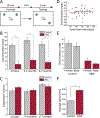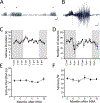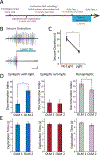Optogenetic intervention of seizures improves spatial memory in a mouse model of chronic temporal lobe epilepsy
- PMID: 32072628
- PMCID: PMC7708390
- DOI: 10.1111/epi.16445
Optogenetic intervention of seizures improves spatial memory in a mouse model of chronic temporal lobe epilepsy
Abstract
Objective: To determine if closed-loop optogenetic seizure intervention, previously shown to reduce seizure duration in a well-established mouse model chronic temporal lobe epilepsy (TLE), also improves the associated comorbidity of impaired spatial memory.
Methods: Mice with chronic, spontaneous seizures in the unilateral intrahippocampal kainic acid model of TLE, expressing channelrhodopsin in parvalbumin-expressing interneurons, were implanted with optical fibers and electrodes, and tested for response to closed-loop light intervention of seizures. Animals that responded to closed-loop optogenetic curtailment of seizures were tested in the object location memory test and then given closed-loop optogenetic intervention on all detected seizures for 2 weeks. Following this, they were tested with a second object location memory test, with different objects and contexts than used previously, to assess if seizure suppression can improve deficits in spatial memory.
Results: Animals that received closed-loop optogenetic intervention performed significantly better in the second object location memory test compared to the first test. Epileptic controls with no intervention showed stable frequency and duration of seizures, as well as stable spatial memory deficits, for several months after the precipitating insult.
Significance: Many currently available treatments for epilepsy target seizures but not the associated comorbidities, therefore there is a need to investigate new potential therapies that may be able to improve both seizure burden and associated comorbidities of epilepsy. In this study, we showed that optogenetic intervention may be able to both shorten seizure duration and improve cognitive outcomes of spatial memory.
Keywords: behavior; closed-loop; cognitive impairment; comorbidity; temporal lobe epilepsy.
Wiley Periodicals, Inc. © 2020 International League Against Epilepsy.
Conflict of interest statement
Conflicts of Interest
We declare no conflicts of interest.
Figures



References
-
- Elger CE, Helmstaedter C, Kurthen M. Chronic epilepsy and cognition. Lancet Neurol 2004;3:663–72. - PubMed
-
- Cánovas R, León I, Serrano P, Roldán MD, Cimadevilla JM. Spatial navigation impairment in patients with refractory temporal lobe epilepsy: Evidence from a new virtual reality-based task. Epilepsy Behav 2011;22:364–9. - PubMed
-
- Amlerova J, Laczo J, Vlcek K, Javurkova A, Andel R, Marusic P. Risk factors for spatial memory impairment in patients with temporal lobe epilepsy. Epilepsy Behav 2013;26:57–60. - PubMed
-
- Perucca P, Gilliam FG. Adverse effects of antiepileptic drugs. Lancet Neurol 2012;11:792–802. - PubMed
Publication types
MeSH terms
Substances
Grants and funding
LinkOut - more resources
Full Text Sources
Molecular Biology Databases

